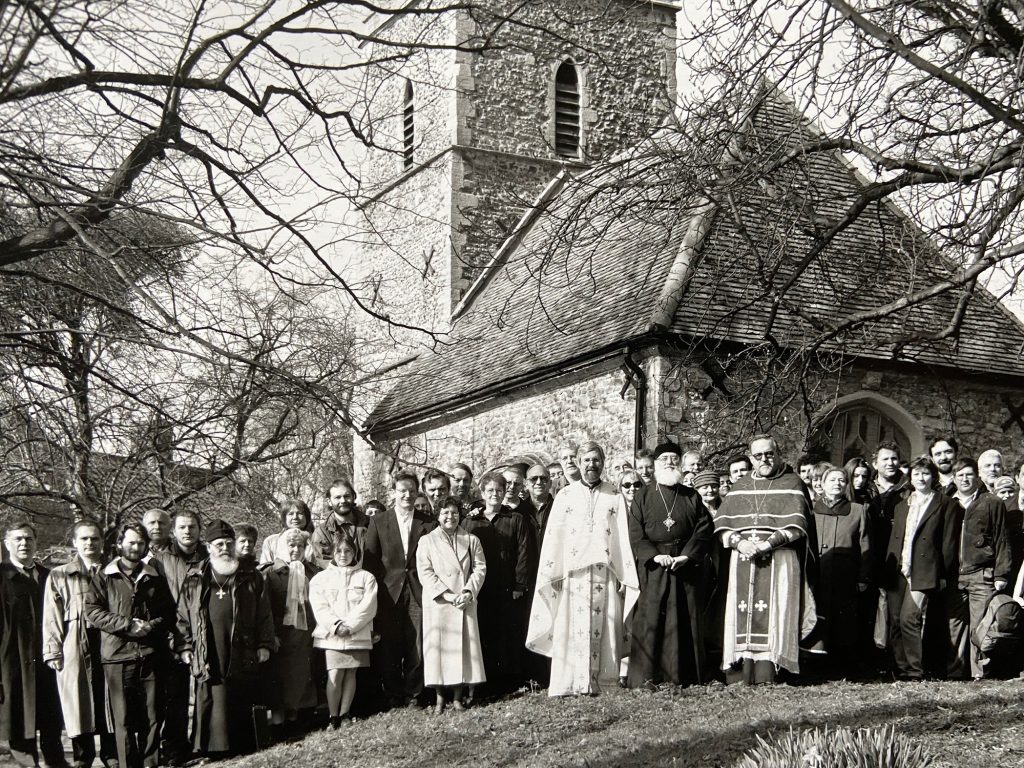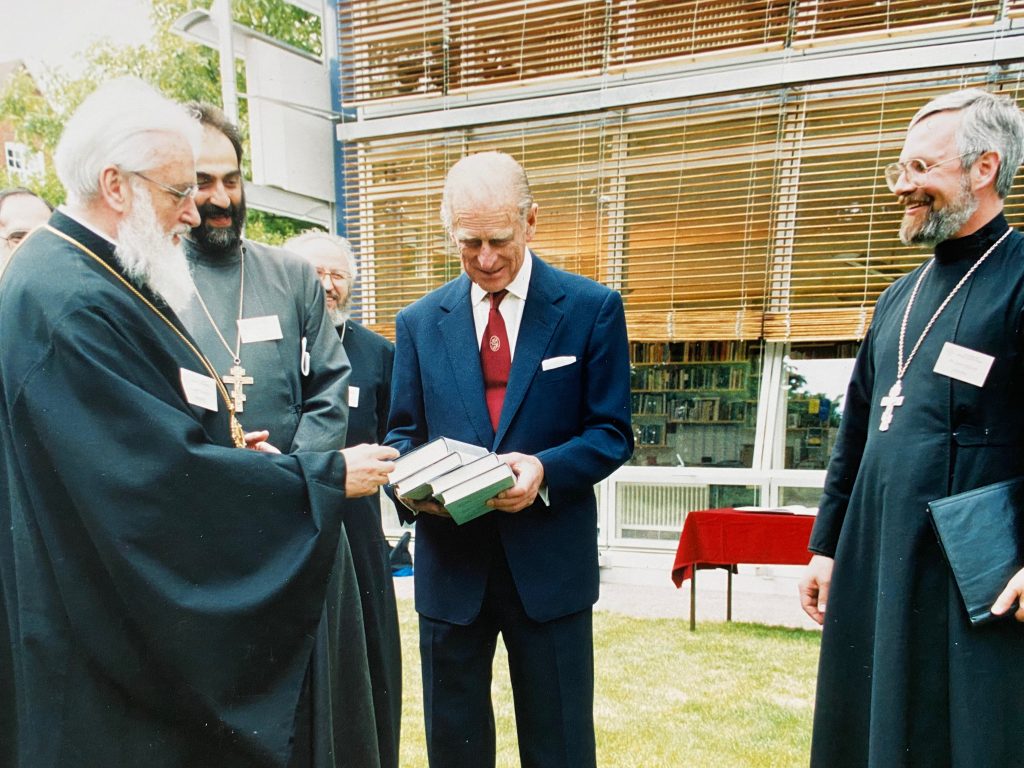by Revd Dr John A. Jillions
Metropolitan Kallistos Ware is universally associated with the University of Oxford, but for 25 years he was also intimately involved in the details of founding, inspiring, directing, and nurturing the Institute for Orthodox Christian Studies in Cambridge. I worked closely with him from its early days in 1997 and then as its first principal from 1999 to 2003. The details of his involvement and how this project that began as an improbable dream came to life should be a matter of record as we mourn his passing.
First, some background. I’d written to Bishop Kallistos in early 1994 to ask about doctoral studies in New Testament at Oxford and received an encouraging reply. But in the end, largely to become familiar with Orthodox life in Greece, I went to the University of Thessaloniki to study under Prof Petros Vassiliadis and write a dissertation on divine guidance in the era of the New Testament. After a year in Greece, he recommended that I continue my doctoral research in Cambridge. So in August 1995 I arrived in Cambridge with my wife Denise and our three young sons, and took up a desk at Tyndale House, an exceptional residential biblical research library. Ecclesiastically, I was on leave of absence from the Orthodox Church in America and was serving under Metropolitan Anthony Bloom in the Diocese of Sourozh. I was attached to the parish of St Ephraim in Cambridge, which at the time was served by Bishop Basil Osborne who would come up from Oxford to serve the Divine Liturgy at St Edmund’s College for the small community.
For me this was a temporary academic leave and I fully expected to return to the United States to serve and teach after completing my PhD. When those plans unexpectedly fell apart in early 1997 my wife and I were not sure at all what to do next. We took some time to seek counsel from others, pray, and consider what we might do to serve the Orthodox Church if we stayed in England. Most obviously, although there were plenty of gifted theologians, there was no theological college for the formal study of Orthodox theology. Could a plan be put together to start an Orthodox studies program in Cambridge?

I tested this thought with Prof David Ford, the Regius Professor of Divinity at the University of Cambridge. He had been instrumental in arranging for Metropolitan Anthony Bloom to receive an honorary doctorate from Cambridge in 1996. He was especially hopeful about bringing a young Orthodox scholar from Russia as a visiting scholar, Igumen Hilarion Alfeyev, himself a brilliant patristics student of Bishop Kallistos. Prof Ford said this seemed the right moment to think of a role for Orthodox theology in Cambridge. He was concerned that there was a great gap between what Oxford and Cambridge were doing on this score. Cambridge needed to have much more on the Christian historical tradition of Eastern Orthodoxy. But he was even more intrigued by the idea that Orthodox theology need not be relegated to the “church history” basket but had much to offer contemporary dialogue about modern theology. “I am interested in the links that the Orthodox attention to mystery, the mystical, and the suprarational can bring not only to Christians of other denominations, but to the experience of other religions.” He emphasized that we could indeed think of the very long term in Cambridge, “in terms of oak trees,” because of the nature of Cambridge University: we can expect it to last long past our own generation.
Prof Ford suggested that we might think about organizing a conference on the future of Orthodox theology and theological education that would bring together the best Orthodox minds from around England. And he invited me to attend the “Future of Theology” seminars which were just then getting underway in the Faculty of Divinity. The next year, working with Bishop Kallistos, we took up Prof Ford’s suggestion and held just such a conference on Orthodox theology, featuring as speakers Bishop Kallistos, Prof Andrew Louth and Elisabeth Behr-Sigel.
In the meantime, Denise and I started sketching out initial plans for the vision of such a school and on March 15, 1997, I called Bishop Basil, the assistant to Metropolitan Anthony, to broach the idea for an Orthodox theological college in Cambridge. He was excited about this and said he would speak with Met Anthony and then Bishop Kallistos about our plans and advised writing a formal draft proposal. He thought that the natural place would have been Oxford, and as far back as Nicolas Zernov there had been hopes for an Orthodox theological college there, but he said “we’ve been trying for years and nothing has ever happened.” So he felt that this was perhaps the right moment to try something else.
On March 31st we sent the draft plan to Bishop Basil and Metropolitan Anthony, then in May after some tweaking to Bishop Kallistos, Prof Andrew Louth, Fr Ephrem Lash, Fr Michael Harper, Fr Sergei Hackel, Prof David Ford and many others, and there was a very encouraging response. But by late summer I hadn’t heard back from Bishop Kallistos, and was getting anxious. Without him the project could not go forward. In August 1997 I was in Oxford first with Metropolitan Anthony for the annual conference of the Diocese of Sourozh and then for a weeklong summer course on “St Basil’s On the Holy Spirit,” taught by Prof Andrew Louth and Bishop Kallistos. During the Sourozh conference Bishop Kallistos immediately put me at ease when we met briefly after lunch following the Dormition liturgy, and we agreed to speak at length the following week when I was back in Oxford for the summer course. He said in his vigorous, deliberate, expansive way, “Yes. I am in favour. I am supportive.”
As one can imagine, the course on the Holy Spirit was mesmerizing, interspersed with meals and informal conversation with the two professors and about a dozen students from around the world. When we finally spoke at length about plans for an institute in Cambridge, Bishop Kallistos gave his full-throated backing. He said there had been several proposals in the past to start something in Oxford but they’d all come to nothing. And he admitted that he felt most at home with individual students rather than starting an institution. He’d thought of starting a house of studies for years in Oxford, but some freshness was needed to get a new initiative off the ground, and that’s what Cambridge appeared to have at that moment. The theological climate there might be better for such a pan-Orthodox project to get going both because of the clear welcome from the Faculty of Divinity, and because of the well-organized Cambridge Theological Federation which brought together a number of theological colleges of different denominations. He agreed that the best approach would be for Metropolitan Anthony to write to Archbishop Gregorios of Thyateira asking him to appoint Bp Kallistos and Prof Louth to a working group.
At the first organizational meeting of the pan-Orthodox “Working Group” on March 26, 1997, at Ridley Hall in Cambridge, Bishop Kallistos led the list of well-known participants, which included Bishop Basil, Prof Andrew Louth, Fr Ephrem Lash, Fr Sergei Hackel, Fr Michael Harper, Revd Dr John Binns (Great St Mary’s the University Church of Cambridge), and others. Revd Joy Tetley represented the Cambridge Theological Federation and Dr Eamon Duffy the Faculty of Divinity. Metropolitan Kallistos would summarize key points periodically and was fully engaged—as he always was—in the broad picture but also the details.
I worked for the next two years with Bishop Kallistos and the Working Group to prepare for the Institute’s opening in 1999. In May 1999, he wrote:
Its foundation has my full and enthusiastic support, and I am happy to have been from the very beginning an active member of the Working Group which is making plans for its establishment…

The Institute formally opened its doors to students in September 1999, and Bishop Kallistos was there as Chairman of the Board and teaching regularly. Two years later, in June 2001 Bishop Kallistos welcomed HRH Prince Philip, chancellor of the University of Cambridge to learn about the fledgling Institute and encourage support. And just now in 2022, only a few weeks before his repose, Metropolitan Kallistos was again writing in support of the Institute, this time encouraging the campaign to fund a Lectureship in Orthodox and Ecumenical Studies:
I am pleased to have been asked to be a Patron of the appeal launched by the Institute for Orthodox Christian Studies to raise funds to establish a Lectureship in Orthodox and Ecumenical Studies. The Institute has been providing a unique study centre over the past 23 years and I believe that this position will add greatly to its continuing resources and contribution. I give my blessing to this appeal and to the work of the Institute and am pleased to be associated with it.
I hope the time will come when Metropolitan Kallistos’ legacy will be recognized and made permanent through a lectureship in his name in the University of Cambridge. Indeed, around the time of his birthday last year (September 10), and after a few preliminary conversations with others, I wrote this to Metropolitan Kallistos to seek his blessing for this idea:
When I think back to my earliest conversations with Prof David Ford, he emphasized that the key to permanence in the university would be an endowed university lectureship in the Faculty of Divinity. Over the past twenty years all the Institute’s development efforts have been rightly directed toward support of the Institute itself, but maybe this is the time for a major international campaign to establish something like a “Metropolitan Kallistos Ware Lectureship in Eastern Christian Studies.” But before going any further we would need your blessing, so I would like to know your thoughts about pursuing this.
Ten days later Metropolitan Kallistos replied:
Dear Fr John,
Thank you for your message of 10 September, passed on to me by Simon Jennings. I am somewhat surprised by the proposal that a lectureship might be established in my name. If that were to prove possible, I would of course feel highly gratified. Please keep me informed about the development of your plans.
May God give you a blessed life now that you are retiring from parish ministry. Please come and see me whenever you come to England.
With my prayers and blessing, and my love in Christ,
Metropolitan Kallistos
“Your old men will dream dreams” (Joel 2:28, Acts 2:17). I hope this dream may, by God’s grace, eventually become reality, to the glory of God whom Met Kallistos served so fully and so remarkably as scholar, monk, priest and bishop.
